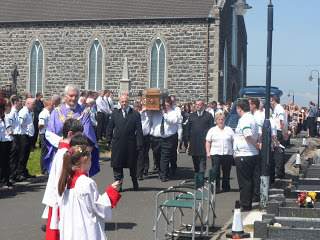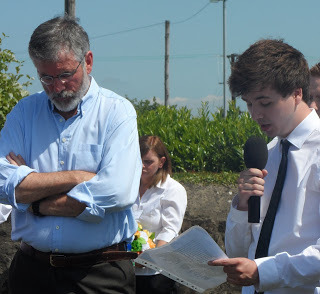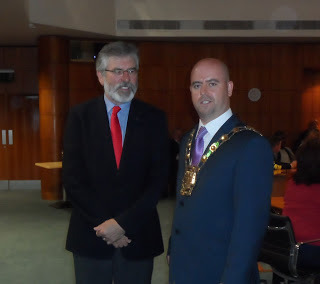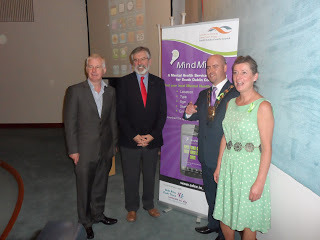Gerry Adams's Blog, page 65
July 18, 2013
Lá Breithe Madiba
 I want to extend birthday wishes to Nelson Mandela – Madiba - who is 95 today.
I want to extend birthday wishes to Nelson Mandela – Madiba - who is 95 today.“ Lá breithe shona duit Madiba”.
People around the world will today celebrate Madiba’s birthday with him and his family.
Throughout his life Madiba has demonstrated enormous courage, vision and tenacity.
He is a role model and example to us all.
Madiba is in my view the greatest political leader of our time.
Published on July 18, 2013 06:09
July 17, 2013
Fighting for the rights of the oppressed -Toshi Seeger

At the weekend I learned with great sadness of the death of Toshi Seeger. She died on July 9th. She had just turned 91 on July 1st. Four years ago I had the huge pleasure of meeting her and her husband Pete at their home in Upper New York State.
As a teenager growing up in the 1960s Pete Seeger was and still is one of my heroes. He was an American singer songwriter and was already a legend by that time. Seeger was a contemporary of Lead Belly and Woody Guthrie; wrote and sang songs of protest; was vocal in his opposition to segregation and racism, and in support of trade unions, and in the 1950’s he was blacklisted during the McCarthy era.
His songs helped shape the music of the 20th century and influenced generations of other musicians. For over 70 years he has been out there singing his songs and making music for workers and fighters for civil rights, and women and disadvantaged people. He still is at ninety four years of age.
Anyone who saw him on television with Bruce Springsteen and a gang of
other wonderful musicians at the first Obama inauguration will have marvelled at the man’s energy and musicality. And he is still an activist. And an idealist.
Four years ago, during one of my mad schedules of events in the USA and Canada a mutual friend arranged for me to travel to Pete’s home in Beacon, in the Hudson River Valley in Upper New York State and to meet him and his wonderful wife Toshi.
They live in a forest. In 1949 he and Toshi bought a bit of land and lived in a trailer before building a log cabin and after some time the house that they now live in. It is a very beautiful and quite isolated place.
When we arrived at the front door Pete was on his way out. He was pushing a wheelbarrow.
‘Here are our friends, all the way from Ireland’ he announced to Toshi, a
small cheery faced woman who was busy at the table in the big kitchen.
She welcomed and shepherded us into the heat while her husband wheeled
his barrow outside.
‘Pete was bringing in wooden blocks for the fire’ Toshi explained.
Soon we were gathered in a circle listening to Pete’s yarns. He is a
natural story teller and within minutes he was singing for us to
illustrate a point. His first songs were pop songs from the 1920’s and
he sang a few bars to give us a flavour of that time.
‘Now here’s one an Irish plumber taught me forty years ago and he launched
into Óró Sé Do Bheatha Bhaile.
‘Óró sé do bheatha bhaile. Oró sé do bheatha bhaile. Oró sé do bheatha baile. Anios ar theacht an tsamhraidh.’
This Blog is pleased to say that I sang close harmony on that one.
And before we knew we were into Guantanamera and then If I Had A Hammer and Pete was talking about his parents and his grandparents and his Irish great granny and Woodie Guthrie, and The Weavers and Ireland and Tommy Makem and the Clancy Brothers and Tommy Sands and Bruce Springsteen and the Clean Up the Hudson campaign, all interspersed with songs and Toshi was making tea and keeping him right.
Because that’s what she did for 70 years – organising his life and keeping him right.
Speaking after her death Pete described her as the ‘brains of the family’. ‘I’d get an idea and wouldn’t know how to make it work and she’d figure out how to make it work.’
In a biography of him in 1981 the author said of Toshi: ‘As Pete’s producer she made sure he was in the right place at the right time and in the right mood and knew where to go next. When problems arose she took the blame. At tax time when her shy singer couldn’t face how much money he earned – or worse, how much he gave the government for war – Toshi would place a blank page over the return when he signed it.’
Toshi produced his concerts, organised his schedule, helped found the Newport Folk Festival and made an Emmy award winning documentary about him.
She was fundamental to his life. But she also had a wicked sense of humour. One friend of the family recalls seeing an old cartoon on the wall. It’s of a woman answering the phone and she’s got a child under her arm and the phone in her hand and she’s doing the dishes and mopping the floor with her foot and the caption reads something like; ‘I’m sorry my husband can’t come to the phone right now. He’s out fighting for the rights of the oppressed.’
Our visit to their home in November 09 was a special moment. Toshi’s death is a huge blow to Pete and their son Daniel, daughters Mika and Tinya, their six grandchildren and one great grandson. But it is also a loss to all of us who have admired and enjoyed the music of Pete Seeger.
Go ndeanfaidh Dia trocaire uirthi.
Published on July 17, 2013 11:00
July 11, 2013
Christopher O Neill - A Brave, Courageous Republican

Early this morning I left Dublin and travelled to Kilrea in county Derry. It was there in the early hours of Saturday morning last weekend that two young men from that community were killed in a tragic road accident.
Christopher O Neill and Declan McKenna were both aged 22. Christopher O Neill was also a leading Sinn Féin member in the area.
Today Deputy First Minister Martin McGuinness, Daithi McKay MLA and local Sinn Féin Councillors and party activists and hundreds of local people joined with the family to bury their Christopher.
Kilrea came to a stop. It’s much like any small town in rural Ireland and in brilliant sunshine the funeral cortege followed behind a coach pulled by two black horses.
We made our way to St. Mary’s in whose cemetery two other Sinn Féin members, Tommy Donaghy and Danny Cassidy who were killed by unionist death squads are also buried.
This is my oration at the graveside of Christopher O Neill.
“I am very sad but very honoured to be here speaking to you today at the funeral of Christopher who was tragically killed on Saturday with his friend Declan who was buried yesterday.
I want to welcome all of you who have travelled here this morning to stand with Christopher’s clann and to extend to them on your behalf, and to the McKenna clann, our sincerest condolences and solidarity at this terrible time.
Tá muid buioch daoibh. Tá fhios agam go bhfuil bhur croí briste. Caithfidh mé a rá go bhfuil a lan daoine brónach inniu. Caill muid ar cara.
The deaths of Christopher and his friend Declan have left a deep void in the lives of the O’Neill, Davey and McKenna families; their extended family circles and the community of Kilrea.
Their deaths are a deep blow to these families.
To Christopher’s mother Maria, his sister Ciara and girlfriend Mairead and their entire families I want to express my sincerest sympathies and condolences on behalf of republicans everywhere. Your loss is a terrible one.
I have some limited sense of what you are going through. Two of my young nephews – teenage brothers Liam and Miceál – were killed in a car crash.
Families never get over such a loss. You can only slowly learn to live with it.
So I hope it is some small consolation for you to know that you are in the thoughts and prayers of Christopher’s comrades, of your neighbours and people everywhere.
Christopher’s death at any time would have been hard but coming as it did on the first anniversary of the death of his father Kevin it was especially traumatic for the family.
Christopher and Declan were only 22. They were childhood friends growing up across the street from each other and going to the same school – St. Paul’s College in Kilrea.
From a very young age Christopher had a deep interest in Irish republicanism. He grew into a deeply committed republican activist. Christopher joined Sinn Féin at the early age of 16 and was highly regarded by all of his colleagues.
He was a member of the Dunloy Fallen Comrades Flute Band and was also the Chair of McGinn/Rodden/Donaghy/Cassidy Sinn Féin Cumann in Kilrea. This was an important role which he fulfilled with energy and distinction.
In 2011 he stood as a candidate for Sinn Féin in the Skerries ward in Coleraine Council picking up almost 300 votes and coming close to taking the last seat. Those who canvassed with him were impressed by his energy and enthusiasm and ability to articulate Sinn Féin policy.
This struggle has been blessed by having so many brave and courageous people involved with it. Christopher was one of these. He played his part.
Christopher’s death is not the first tragedy inflicted on his family. You suffered the devastating loss of his grandfather; our friend and comrade Councillor John Davey who was shot and killed in February 1989.
John is an iconic figure in the decades of republican struggle. He was a lifelong republican, who worked tirelessly for his community and who was loved by all who knew him.
I never to my knowledge met Christopher but without doubt we were in attendance at the same meetings in our time. I have met many hundreds of young activists, like Christopher, who have become involved in this struggle in the years since the IRA cessations and the Good Friday Agreement. Young men and women who were only youngsters in the worst years and have no personal recollection of the war or who weren’t even born then.
Like them Christopher was a republican through conviction. Yes, he was conscious of his grandfather’s enormous contribution to Irish republicanism and of the circumstances of his death, but Christopher’s republicanism also came from his own deep understanding of the damaging effects of partition and British government involvement on this island.
Christopher understood that the republican struggle for freedom and justice and the reunification of Ireland is the best means to secure a lasting peace between the people who live on this island and between these islands.
I am very certain that John Davey, who helped lay the foundations of a strong republican party in this area, would be enormously proud of Christopher. He would be equally proud of the achievements of local republican activists.
Because of the sacrifice of men and women like John Davey and Tommy Donaghy and Danny Cassidy, of Sheena Campbell and Bernard O’Hagan and the hard work and dedication of younger activists like Christopher O Neill, Sinn Féin and Irish republicanism is stronger now than at any time since partition.
In the 2011 local government elections Sinn Féin emerged with 25% of the overall vote and 138 council seats – a huge achievement. While other parties were in decline Sinn Féin’s vote and the number of seats we held increased. Christopher contributed to that.
Christopher will be missed by his family and all who knew him.
He will also be missed by his republican family. Next year we will be facing into the next round of elections for local councils and European elections. I have no doubt that Christopher would have been central to that endeavour in this area.
He would have been on the streets and laneways rapping doors, canvassing, arguing the republican case and looking votes for candidates – including probably himself.
But more than all of this Christopher was a much loved son, brother, boyfriend, cousin, uncle, friend. All of you who knew him best will have your own special memories. Keep them fresh; keep those memories – stay strong and be glad and proud of Christopher your family member, your friend and our comrade and his friend Declan.”

Christopher’s friend and comrade Sean Bateson also spoke at the graveside. Sean said:
“It is with great sadness that I stand before you at the graveside of Christopher O’Neill to pay my respects on behalf of Sinn Féin Republican Youth.
As you are well aware coming from the many comments and remarks from everyone over the past few days, Christopher was an exceptional young lad who had his whole life ahead of him but instead it was tragically taking from him in the early hours of Saturday morning along from him on the early hours of Saturday morning along with his close friend Declan McKenna.
I knew Christopher well, he was a comrade but also a friend of mine and it was only last Thursday that me and him sat outside the front of my house chatting about politics and this and that and the other.
Unfortunately like the rest of you it will be the last time I will ever get to speak to Chrissy again.
But that’s the type of lad Chrissy was. He was an exceptionally kind, generous, down to earth and warm hearted lad who had all the time of the day to sit and shat away to everyone regardless of who they were. These are the type of attributes which made Chrissy such a fantastic, capable and talented young Republican and he took these with him as he served the role of Chairperson of the local Sinn Féin Cumann here in Kilrea.
Coming from a large republican family with his grandfather being John Davey, a Sinn Fein Councillor from Lavey who was murdered by loyalists acting in collusion with British state forces in 1989, Christopher knew fine well about the struggle for equality, justice, unity and freedom here in Ireland and this is what propelled him to take on such a role within the republican movement.
His untimely death at such a young age is a great loss to the republican movement and of course to his family and friends and the wider community here in Kilrea and beyond.
I want to extend my sincere and heartfelt condolences to the O Neill and McKenna families on behalf of Sinn Féin Republican Youth. Our thoughts and prayers are with you at this very difficult time.
Published on July 11, 2013 11:08
July 10, 2013
Weasel words from Micheál Martin
On Tuesday in the course of Taoiseach’s Questions in the Dáil the Fianna Fáil leader Micheál Martin raised the issue of the Boston tapes, paraded the Ed Moloney book based on some of these tapes, and spoke about the PSNI investigation into the killing of Jean McConville.
The Taoiseach said he had not raised the issue and therefore would not be making a statement. Mr. Martin then went on to make his remarks.
Later that evening I met some of the families of those who were killed and secretly buried by the IRA. I made clear my commitment to do all that I can to help find all of the remains and to bring closure to them.
I am publishing on this blog my response in the Dáil:
“I am uncertain as to whether I should ignore the leader of Fianna Fáil in his charges. Sometimes, it is impossible to know what the right thing to do is when someone comes in with a book, parades it in the Chamber, makes accusations and engages in weasel words.
Should I sit on my dignity and let this pass or get up and speak to the issue? I was very taken last week talking about other tapes - the Anglo Irish Bank tapes - to note mentally that the leader of Fianna Fáil spoke to the Taoiseach and said "You choose to exploit the past, not to learn from it". I said "Micheál, I hope you remember that".
The Boston tapes is a matter that is in the hands of the PSNI and it will do with that what it wants.
I have been very restrained in my comments about all of that and will continue to be. I have consistently rejected claims, however, by those who accuse me of having any knowledge of or part in the disappearance and killing of Jean McConville.
The issue of those who were detained, abducted, shot and buried by the IRA is a terrible legacy of the conflict. We know it is not unique to this phase of the conflict. It has happened at other times. There are still issues going back to the Civil War and the Tan war, which have to be resolved.
At least, this generation of republicans, among whom I count myself, is trying to undo the wrong that was done.
Clearly, those who were killed cannot be brought back to life, but I do think that a grievous wrong was done. For its part, the IRA, which is now on ceasefire, has left the stage and is not around, apologised for what it did.
I have been very much part of the effort to retrieve these remains since I was approached by some of the families. Some of the families are republican families. Some of them are friends of mine. Some of them are neighbours of mine. Fr. Alec Reid, others and I have worked very hard, which the leader of Fianna Fáil must know.
The commission was established under a Government of which he was a part. The different suggestions that were put and the co-operation the IRA, including what were referred to as "primary sources", gave to the commission are matters of public record. The man who is in charge of the special forensic investigating team, which was put in place on suggestion from us, has acknowledged all of this.
He said in 2009 that those who were working with him were working in a spirit of co-operation and reconciliation to help in every way they could. He said he was absolutely convinced that they were doing everything they could to assist.
Now, we come to how this is used to score political points. I am also meeting the families this evening. I made the point earlier that some of them are friends of mine and many are my neighbours.
Those who make accusations against me, apart from those in the Dáil, are implacable opponents of the peace process.
They say there should not be a peace process and the war should have continued, and they attack me as a means of undermining that.
Some of them are passed, some of them are still active and some of them are still out there. At least, they have their convictions. They are not doing it for electoral gain. They are not doing it for political point scoring. They are not doing it as a Fianna Fáil leader trying to reclaim the republican mantle which was so despoiled by successive Fianna Fáil leaderships which let the people down in a most deplorable and anti-republican way.
It is also my view that those who brought together this Belfast project have a similar view. These two individuals who misled are not supporters of the peace process. They have since acknowledged that they could not and should not have given the commitments which they gave that these would not be revealed until these individuals were dead.
I am trying not to fall into the trap here of trading points on other people's wounds with the leader of Fianna Fáil. I have a deep investment in what is happening in the North. I will continue to have a deep investment. I do not shy away, I do not hide, I do not disassociate myself but I like to think that I am also defined, as are those who work with me, by what we have still to do.
I would appeal, once again, because I believe - I cited the person in charge of the forensic team's statement that republicans are co-operating actively - the remains of nine of these persons have been recovered and are in graves that their families can visit. Seven have still to be found.
Not all of those seven were killed by the IRA, but seven have still to be found and we all need to do our best to play a positive role in this.
I appeal, once again, to anyone with any information whatsoever, no matter how small, tiny or insignificant he or she thinks it might be, to bring that forward to the commission, to the families, to the Garda or to the PSNI, or to me or anyone else he or she thinks can usefully bring this forward to help these families.”
I went on: “I do so again today. Will that be the end of the matter? Of course not because this party, (Fianna Fáil) under its current leader, is fighting a battle for its survival and that is its only concern in raising this issue. I repeat what Teachta Micheál Martin said last week to the Taoiseach: "You have chosen to exploit the past, not to learn from it." He should practice what he preaches. The abduction, killing and burial of the people concerned was a grave injustice, but efforts are ongoing and when the seat on which Deputy Micheál Martin has his bum is cold, they will still be ongoing until all the remains have been returned.
Jean McConville was one of those whose remains were retrieved through the diligent work of the people on the commission and others, but the remains of seven people have yet to be found. We have to continue with our efforts, no matter what is said or how this is used or exploited for party political gain.”
Published on July 10, 2013 16:16
July 7, 2013
Remembering – July 8th 1981

Tomorrow we remember some of the victims of Thatcher’s militarist Irish policy among them hunger striker and IRA volunteer Joe McDonnell, Nora McCabe and Fian John Dempsey.
Joe, who was arrested in October 1976 along with his close friend and comrade Bobby Sands, died on July 8th 1981. He was the fifth of the hunger strikers to die. Joe, who was aged 30, was also one of those who stood in the 1981 general election for the Dáil. He missed out on winning a seat in Sligo-Leitrim by 315 votes.
Each of those who died on hunger strike was a unique and exceptional individual in their own right. Joe was married to Goretti. They had two children, Bernadette and Joseph. He was born in the Lower Falls but grew up in the Greater Andersonstown area and came to live in Lenadoon Avenue where he was a well-known and very popular man. When talking about him now all those who knew him, both in the prison and outside all remark on his great sense of humour. Even in the face of enormous adversity he was always laughing and playing practical jokes. From the day he was sentenced Joe refused to put on the prison uniform to take a visit, so adamant was he that he would not be criminalised. He died just after 5am on Wednesday morning July 8th 1981 after 61 days on hunger strike.
 Nora McCabeA few hours later Nora McCabe, a 33 year old mother of three young children was struck by a plastic bullet fired from an RUC landrover. She was walking from her home in Linden Street just off the Falls Road to a local shop when she was struck in the head. She died the following day.
Nora McCabeA few hours later Nora McCabe, a 33 year old mother of three young children was struck by a plastic bullet fired from an RUC landrover. She was walking from her home in Linden Street just off the Falls Road to a local shop when she was struck in the head. She died the following day.RUC efforts to claim that they were not responsible for the incident and that the only plastic bullet had been fired at two petrol bombers came unstuck when film footage from a Canadian television crew showed that the fatal shot had come from an RUC landrover and that there were no petrol bombers.
As ever the British system protected its’ own and no one was prosecuted for Nora McCabe’s death. On the contrary the RUC Commander for west Belfast who was in the vehicle from which the plastic bullet was fired and who gave evidence claiming that there were two petrol bombers and that the RUC were never near Linden street, was promoted to the rank of Assistant Chief Constable.
 16 year old Fian John Dempsey was shot and killed by British soldiers at the Falls bus depot. I visited the wake house and attended the funeral. A few days later I wrote in An Phoblacht/Republican News: Until the morning of last Wednesday week, Fian John Dempsey, aged 16, lived in one of the grey houses which sprawl on either side of the Monagh Road in Turf Lodge.
16 year old Fian John Dempsey was shot and killed by British soldiers at the Falls bus depot. I visited the wake house and attended the funeral. A few days later I wrote in An Phoblacht/Republican News: Until the morning of last Wednesday week, Fian John Dempsey, aged 16, lived in one of the grey houses which sprawl on either side of the Monagh Road in Turf Lodge. His family, a week after his death, are now like so many other families, trying to pick up the pieces - in the heart-rending vacuum which is always created by sudden death, especially by the death of one so young and cheerful as John.
At the wake on Thursday week he looks only twelve years old, his body laid in an open coffin flanked by a guard of honour from Na Fianna Éireann.
Hardened by many funerals, by too many sudden deaths, yet one is riveted to the spot unable to grasp the logic, the divine wisdom, the insanity, which tightened a British soldier's trigger finger and produced yet another corpse.
"He's so young, " exclaimed those who call to pay their respects. "Jesus, he's only a child."
All night, neighbours, friends and relatives call. All with the same reaction.
But young people call also, shifting uncomfortably in adult company, but strangely unshocked - not visibly at any rate - by what they see in the sad living room of the Dempsey home.
Just a tightening of young faces as they gaze silently at John's remains, a hardening of eyes, and then silently out again to stand in small groups at the street corner. None of the awkward handshakes and mumbled "I'm sorry for your troubles".
They understand better than most the logic which directed the British Army rifle at John, and, having understood, they pay their respects and move outside - to wait.
John's mother, Theresa, sits comforted by friends, while her husband Jimmy stands, a gaunt figure at the head of his son's coffin, gently stroking John's head. Jimmy shakes hands with Dal Delaney - both fathers of dead patriots (the latter of Dee Delaney killed in a premature bomb explosion in Belfast in January 1980).
Many of Jimmy's prison comrades come to the house. He spent six years in Long Kesh as a political prisoner, and soon talk turns to the Kesh, but not like at an adult wake where 'craic' flows non-stop.
At least, not in the living room, where the youthful figure in the coffin brings one sharply back from what has passed to what lies ahead, from what has been done, to what still remains to be done.
The next morning, the slow sad procession to the chapel on a bright warm summer morning; and after Mass, the girl piper heralding our passing as we make our way, once again, to Milltown. Down from the heights of Turf Lodge, past the spot where John was murdered, and by the British Army barracks, through the open gates of the cemetery, to the republican plot, where two open graves - one for Joe McDonnell - await our arrival.
John left school at Easter. He played hurling and football for Gort Na Mona and soccer for Corpus Christi, and like his father and his many uncles he was a keep fit enthusiast with an interest in body building.
He joined Na Fianna Éireann in October 1980 and like many young people from Turf Lodge, was subjected to regular harassment by British soldiers.
Wreaths are laid before we leave for Lenadoon and the funeral of Joe McDonnell.
John Dempsey's funeral, a smaller and in many ways a sadder ceremony than Joe's, is a stark reminder that for the first time in contemporary Irish history, the struggle has crossed the generation gap.
When Joe McDonnell was first interned in 1972, John Dempsey was a mere seven years old. Yet they were to die and be buried in the same republican plot, within hours of each other, in the service of a common cause and against the same enemy.
As Jimmy Dempsey said of his son, "John has joined the elite. He died for the freedom of his country."
So, did Joe McDonnell. Go ndeanfaidh dia trocaire uirthi.
Published on July 07, 2013 12:33
July 4, 2013
Violence against Women: A cause and consequence of women’s inequality
The recent conviction of Adrian Bayley in Australia for the brutal rape and murder of Jill Meagher, the savage murder of Jolanta Lubiene and her eight year old daughter Enrika in county Kerry and the media furore around the photos of celebrity cook Nigella Lawson being assaulted by her husband, have all brought into sharp focus the issue of violence against women.Co-incidentally two weeks ago the annual report for 2012 from Women’s Aid was published. Its facts were equally shocking.
· One in five women in the Irish state will experience violence and abuse from an intimate partner
· 3,230 disclosures of direct child Abuse to the Women’s Aid Helpline – a 55% increase on the previous year
· 11,729 calls to the Freephone Helpline
· 32 calls per day
· 49% of the women supported in One to One service were experiencing abuse from a former husband, partner or boyfriend
· 30% of first time one to one support visits were with women from migrant communities
· The most dangerous time can be when a woman is planning or making her exit and in the period afterwards.The facts are equally stark in the north. The Making the Grade report in 2007 revealed that:
· In 2006/7 the PSNI responded to a domestic incident every 22 minutes of every day of the year.
· In 2006/7 there were more domestic violence related crimes (10,115) than the combined total for sexual offences against children, indecent exposure, robbery, armed robbery, hijacking, fraud and counterfeiting, shoplifting, dangerous driving, offences and firearms offences
· 20% of all attempted murders in 2006/7 had a domestic motivation
· The rate of conviction for rape decreased from 28.2% in 1994 to 19% in 2005.
· The number of recorded rapes increased from 292 in 2001 to 457 in 2006.
· 84% of victims of sexual offences were women.But as with any statistics it is essential that you look beyond the bullet points and focus on the human experience that they reflect.
The Women’s Aid report records harrowing accounts of this experience. Women have described being locked in and prevented from leaving their houses, being drugged, assaulted and hospitalised, being beaten while pregnant or breast-feeding, being gagged to stop screaming, being raped and sexually abused, including being pinned down and assaulted, and being forced to have sex in return for money to feed their children.For women violence includes but is not limited to domestic violence, forced marriage, rape and sexual assault, crimes in the name of honour, murder, trafficking and sexual exploitation, female genital mutilation, sexual harassment and stalking. It causes physical damage ranging from death to miscarriages to broken limbs. Sexual offences can also result in sexually transmitted diseases and forced pregnancies, as well as leaving long term psychological damage.
Kofi Annan, the former head of the United Nations said: “Violence against women is perhaps the most shameful human rights violation and it is perhaps the most pervasive. It knows no boundaries of geography, culture or wealth. As long as it continues we cannot claim to be making real progress towards equality, development and peace.”
Safe Ireland also published the results of a one day survey which revealed that almost 850 women and children received support and protection from domestic violence over a single 24-hour period on November 6th last year.
The survey found that more than 500 women and over 300 children sought domestic violence services on that day. Almost 270 women and children were accommodated in refuge, with 21 women being turned away due to lack of space. The census also found that more than 20 pregnant women looked for safety from violence.
At its core violence against women is a cause and a consequence of women’s inequality. It cannot be challenged and defeated without a recognition of this. So how do we end it? Coherent, integrated and properly economic, social, cultural and political strategies are needed. Such strategies do work.
Regrettably, in the south the promised consolidated domestic violence legislation contained in the Programme for Government has yet to be delivered. This week I again asked about this in the Dáil. The Minister for Justice wrote me a letter saying that it will be ‘progressed as soon as possible having regard to the need for consultations and other legislative priorities in the Department of Justice and Equality.’Other legislative priorities? What greater priority should there be than protecting the lives and human rights of women and girls.
The bottom line is that there is no underlying strategic approach or priority being given to this issue. The Minister also told my comrade Mary Lou McDonald that the government has still not signed the European Convention on Preventing and Combatting Violence against Women and Domestic Violence. It apparently supports the aims and terms in principle but he claims there is a ‘particular difficulty reconciling property rights under the Irish constitution with the requirement under Article 52 of the European Convention and the availability of barring orders.’
This is also the rationale presented by the Minister for rejecting Woman’s Aid recommendation for an on call system for accessing emergency barring orders to give women and children protection. And yet when the government rushed through legislation in the Dáil earlier this year on the Irish Bank Resolution Company it included a provision requiring the ‘permanent or temporary interference with property rights for the common good.’ So, we can have rushed legislation on property rights to aid banks but no legislation on property rights to help women victims of violence. And all the while violence against women continues.
Published on July 04, 2013 01:20
July 3, 2013
Equality proofing is Labour Party policy – yet they vote against it!
This week Sinn Féin introduced into the Dáil an Equality Proofing Bill. The purpose of the Bill was to amend existing legislation and to provide equality proofing of government policy and budget and public bodies through impact assessments. If passed into law the Bill would have ensured that both government and public bodies in exercising their functions would so in a way that would reduce the inequalities of outcome which result from socio-economic disadvantage. As it was the Labour party voted with Fine Gael against the Bill. Government Minister and Labour TD Kathleen Lynch spoke against equality and ultimately against Labour party policy which supports equality proofing.Essentially the Minister said that we cannot afford equality! From a Fine Gael Minister this would have been understandable – Fine Gael doesn’t believe in equality.But Labour’s stated policy is for the equality proofing. By opposing this equality proofing Bill Labour TDs are voting against their party’s own policy position!What is the value of Labour in government if its only role is to bolster the conservative economic and social politics of Fine Gael?Labour’s founding father James Connolly is accepted as the principal author of that part of the Proclamation which guarantees religious and civil liberty, equal rights and equal opportunities to all its citizens. It contains a commitment to cherish all the children of the nation equally .Sadly, equality does not exist in this society. It is a republic in name only and the policies of this government and of successive governments are contributing directly to a growing inequality – particularly between the rich and the poor.I’m an Irish republican. I believe in a republican system of governance. A real republic in which the people are sovereign and equal, and have all–encompassing rights, including economic rights, the right to a home; to a job; to access to education; to a health service from the cradle to the grave; the right to a safe and clean environment; and to civil and religious liberties.This is what republicanism is about. It is what genuine democracy is about. It’s about embedding equality into the daily life and experience of citizens.The imposition of equality duties, and the equality proofing of government policies and budgets, and of public bodies through impact assessments, are a means of achieving this and of dictating outcomes. Without this equality will remain little more than a pipe dream. It is a fact that inequality is all around us in this part of the island. It exists also in the north but there it has the added dimension of generational sectarian and political discrimination.Interestingly the other parties in the Dáil reference the continued existence of inequalities in the north as a pretext for attacking Sinn Féin. There is no logic to this position. Or truth. Or rational. They quote poverty levels in west Belfast for example to justify their own position.They refuse to acknowledge that the citizens of west Belfast in common with other communities in the north are tackling these issues on a daily basis and succeeding against the odds. And because they took a stand – and they would be waiting a long time for Fianna Fáil or Fine Gael or Labour to help them – because these citizens took a stand generational sectarianism and political discrimination is being tackled.There are now equality duties and the equality proofing of government policies and budgets, and of public bodies. If this is good enough for the north why can’t citizens here have these rights?Equality is cited 21 times in the Good Friday Agreement, including in the Pledge of Office for Ministers. It has a complete section given over to it and is included in legislation designed to ensure equality in employment. We are living in post Good Friday Agreement Ireland. That is obvious in the north.So it is catch-up time in this state and legislating for equality here must be a key part of this. This should include the Charter of Rights which the Irish government signed up to 15 years ago. Apart from being ethically wrong – no person or community should be treated as second class or as non-citizens.The refusal to recognise the Traveller community as an ethnic group is unacceptable. Inequality is also expensive and uneconomic for society. A healthy, more equal, prosperous society is in everyone’s interest. Sinn Féin’s Equality Bill is about achieving this. And the need for this approach is all the more obvious if we consider the record of the current Government. Budget 2012 was found by the ESRI to have had a disproportionate impact on the least well off in society. Budget 2013 repeated this.Everyday sees the removal of citizen’s rights and the reinforcement of privilege for the elites in society. Sinn Féin’s Equality Bill would require an equality impact assessment to prevent the implementation of such blatantly unfair policies. That is why the government voted against this Bill.Sinn Féin is for a new Republic – an all island Republic – a real republic which will deliver the highest standards of services and protections to all citizens equally, guaranteeing parity of esteem and equality of treatment, opportunity and outcome.This also means equality for the Irish language and for rural Ireland.While Labour abandoned Connolly and sided with Fine Gael and the elites in voting down the Sinn Féin Equality Bill the Equality Budgeting campaign which represents over 30 civil society organisations welcomed the Bill. While this round was lost the campaign to achieve equality will continue.
Published on July 03, 2013 13:16
July 2, 2013
There are more tapes!
The Anglo tapes continue to be a source of great annoyance and outrage for citizens.
They provide the most direct evidence yet of the appalling, sneering and arrogant attitude of the banking sector to the banking crisis that crashed the Irish economy five years ago.
Last week I asked the Taoiseach during Leaders Questions in the Dáil if he knew if any other tapes from any of the other banks existed. It is common practise for phone conversations between bankers/brokers to be taped to ensure accuracy over agreements reached.
Last week the Taoiseach said that he didn’t know.
Today I asked the Taoiseach once more about the existence of additional tapes. He admitted that other tapes of conversations in other banks do exist.
He also revealed that the Minister for Finance is writing tomorrow to the banks asking that they ensure that any tapes in their possession are held safe.
I was surprised by this. The fact is that it is five years since the banking crisis and several years since the Gardaí took possession of the Anglo tapes. The first of these tapes was published almost two weeks ago.
But only now is the Minister for Finance taking action. This is evidence of the dismal way in which the government has handled this crisis from the outset.
Much of the focus around the tapes has been on who within the previous Fianna Fáil government knew what was going on and who met with the bankers and what can they tell us of the events of September 2008.
Last week I asked Deputy Martin, who was then a senior figure in the Cabinet to make a statement to the Dáil setting out which Fianna Fáil government Ministers met the bankers. There has been no response to that from the Fianna Fáil leadership.
It would also be important to find out of Fianna Fáil representatives other than ministers had contact with the bankers.
Instead of facing up to these issues the Fianna Fáil leadership has tried hard to distract attention away from its role in the debacle. But the questions won’t go away.
Last week the Taoiseach also said that there were no files of any value in the Department of the Taoiseach. Today I asked him about the files in the Department of Finance and the Central Bank and can these files shed more light on what happened?
He declined to answer.
There is real and understandable public cynicism about the ability of the government to get to the truth. This is inevitable given the close relationship between the golden circles of bankers, some politicians, and developers and speculators.
It was reinforced by the Government rewarding so many senior banking executives with well-placed and highly paid jobs.
As hundreds of thousands of households pay their property tax bills under threat of legal action and families try to pay other bills and put food on the table, they believe there is one law for the rich and well-connected and another for everyone else. There certainly appears to have been no law for the bankers.
The Anglo tapes have revealed that they knew what they wanted– they wanted the ‘moolah’ and were convinced from their relationship with the government that it would be handed over. And they were right. They got it.
The decision to bail out Anglo Irish Bank and the other Irish banks has cost the Irish state almost €100 billion - €64 billion in bank recapitalisation and €32 billion for NAMA.
It helped to collapse our economy and ended up in us losing our economic sovereignty. The Fianna Fáil leadership created this policy
Fine Gael and Labour continue to pay bankers big bucks. In October 2011, Michael Noonan admitted to Sinn Fein’s Pearse Doherty that 22 of the top 50 Anglo bosses at the time of the crisis, still worked in Anglo, and 19 of them were paid salaries over €175,000 each year. One of the men speaking on the Anglo tapes worked in the bank up to February this year.
Fine Gael and Labour paid out all the bank bondholders and inflicted austerity budgets every year to pay for it.
But Fianna Fáil has the most questions to answer.
1. What role did Micheál Martin, now leader of Fianna Fáil and senior Minister at the time, play in the lead-up to the issuing of the bank guarantee and after?
2. Why, when even senior Anglo bosses were saying bondholders would have to be burned, did Fianna Fáil insist on paying out to all the bondholders?
3. Why did Fianna Fáil not ask to see Anglo’s books when the bank first showed signs of financial difficulty – why did it trust what the bank was saying and trust a regulator who’d shown himself to be inept?
4. Why did Fianna Fáil issue a blank cheque to Anglo in October 2008 but not nationalise the bank until January 2009?
5. Did Fianna Fáil’s leader and the Taoiseach of the day think it was appropriate to be playing golf with the head of Anglo Irish in July 2008 and what did they talk about?
6. Which Fianna Fáil representatives talked to Anglo bosses at the time of the guarantee, what did they talk about and will they tell the people what was said? Which of them are still on Fianna Fail’s front bench?
7. Were Fianna Fáil given a report by international bank Merrill Lynch that said Anglo was a basket case and did they ignore that report?
These are just some of the questions that need answers.
They provide the most direct evidence yet of the appalling, sneering and arrogant attitude of the banking sector to the banking crisis that crashed the Irish economy five years ago.
Last week I asked the Taoiseach during Leaders Questions in the Dáil if he knew if any other tapes from any of the other banks existed. It is common practise for phone conversations between bankers/brokers to be taped to ensure accuracy over agreements reached.
Last week the Taoiseach said that he didn’t know.
Today I asked the Taoiseach once more about the existence of additional tapes. He admitted that other tapes of conversations in other banks do exist.
He also revealed that the Minister for Finance is writing tomorrow to the banks asking that they ensure that any tapes in their possession are held safe.
I was surprised by this. The fact is that it is five years since the banking crisis and several years since the Gardaí took possession of the Anglo tapes. The first of these tapes was published almost two weeks ago.
But only now is the Minister for Finance taking action. This is evidence of the dismal way in which the government has handled this crisis from the outset.
Much of the focus around the tapes has been on who within the previous Fianna Fáil government knew what was going on and who met with the bankers and what can they tell us of the events of September 2008.
Last week I asked Deputy Martin, who was then a senior figure in the Cabinet to make a statement to the Dáil setting out which Fianna Fáil government Ministers met the bankers. There has been no response to that from the Fianna Fáil leadership.
It would also be important to find out of Fianna Fáil representatives other than ministers had contact with the bankers.
Instead of facing up to these issues the Fianna Fáil leadership has tried hard to distract attention away from its role in the debacle. But the questions won’t go away.
Last week the Taoiseach also said that there were no files of any value in the Department of the Taoiseach. Today I asked him about the files in the Department of Finance and the Central Bank and can these files shed more light on what happened?
He declined to answer.
There is real and understandable public cynicism about the ability of the government to get to the truth. This is inevitable given the close relationship between the golden circles of bankers, some politicians, and developers and speculators.
It was reinforced by the Government rewarding so many senior banking executives with well-placed and highly paid jobs.
As hundreds of thousands of households pay their property tax bills under threat of legal action and families try to pay other bills and put food on the table, they believe there is one law for the rich and well-connected and another for everyone else. There certainly appears to have been no law for the bankers.
The Anglo tapes have revealed that they knew what they wanted– they wanted the ‘moolah’ and were convinced from their relationship with the government that it would be handed over. And they were right. They got it.
The decision to bail out Anglo Irish Bank and the other Irish banks has cost the Irish state almost €100 billion - €64 billion in bank recapitalisation and €32 billion for NAMA.
It helped to collapse our economy and ended up in us losing our economic sovereignty. The Fianna Fáil leadership created this policy
Fine Gael and Labour continue to pay bankers big bucks. In October 2011, Michael Noonan admitted to Sinn Fein’s Pearse Doherty that 22 of the top 50 Anglo bosses at the time of the crisis, still worked in Anglo, and 19 of them were paid salaries over €175,000 each year. One of the men speaking on the Anglo tapes worked in the bank up to February this year.
Fine Gael and Labour paid out all the bank bondholders and inflicted austerity budgets every year to pay for it.
But Fianna Fáil has the most questions to answer.
1. What role did Micheál Martin, now leader of Fianna Fáil and senior Minister at the time, play in the lead-up to the issuing of the bank guarantee and after?
2. Why, when even senior Anglo bosses were saying bondholders would have to be burned, did Fianna Fáil insist on paying out to all the bondholders?
3. Why did Fianna Fáil not ask to see Anglo’s books when the bank first showed signs of financial difficulty – why did it trust what the bank was saying and trust a regulator who’d shown himself to be inept?
4. Why did Fianna Fáil issue a blank cheque to Anglo in October 2008 but not nationalise the bank until January 2009?
5. Did Fianna Fáil’s leader and the Taoiseach of the day think it was appropriate to be playing golf with the head of Anglo Irish in July 2008 and what did they talk about?
6. Which Fianna Fáil representatives talked to Anglo bosses at the time of the guarantee, what did they talk about and will they tell the people what was said? Which of them are still on Fianna Fail’s front bench?
7. Were Fianna Fáil given a report by international bank Merrill Lynch that said Anglo was a basket case and did they ignore that report?
These are just some of the questions that need answers.
Published on July 02, 2013 13:20
June 28, 2013
Sinn Féin will support Bill
Yesterday I contributed to the second stage on the debate of the Protection of Life during Pregnancy Bill 2013. The first Dáil vote on the Bill is now expected after Order of Business on Tuesday after 5pm.
For those interested in the progress of this important legislation below are my remarks.
“Minister, I am personally not in favour of abortion.
That is my strongly held view.
But I am not here to legislate for me.
Especially not on this issue.
I have a duty and responsibility to legislate for citizens – in this case pregnant women whose lives are at risk.
So, I and Sinn Fein will support the Protection of Life in Pregnancy Bill.
Sinn Féin believes that Irish society has a responsibility to not only address the issue of abortion but also to address the fact that thousands of Irish women travel to Britain each year for abortions.
We also believe that all possible means of education and support services should be put in place to prevent crisis pregnancies.
Sinn Féin believes that the way to tackle the issue of abortion is by way of comprehensive education, full access to child-care and comprehensive support services, including financial support for single mothers.
And that full information and non-directive pregnancy counselling should be freely available.
I am very strongly opposed to any attempt to criminalise or to be judgmental of women who have had abortions.
Who here in this chamber or indeed outside this chamber has the right to judge these women?
I am concerned that this Bill could potentially lead to a woman, in whatever circumstances, being sentenced to up to 14 years in prison.
The fact is that the lives of some women are placed at a real and substantial risk due to their pregnancy.
In these casesonly a termination of the pregnancy, as distinct from the termination of the life of the unborn, though that can be a consequence of the intervention, is going to save their lives.
This is already accepted practice in this state.
It is also the current legal position, as is an intervention where the woman's life is at real and substantial risk due to the threat of suicide.
If passed into law this Bill will legalise a termination only where there is a real and substantial risk to the life of the mother, including suicide.
This legislation has been a long time coming and the issue which gives rise to it has been at the centre of considerable debate and controversy for many years.
The tragic death last year of Savita Halappanavar, and the evidence emerging out of the inquest, refocused attention on this issue.
It also underlined the urgent need for legal clarity for doctors and protection for pregnant women.
The HSE report on Savita’sdeath was published in the last few weeks and on the same day as this Bill and because of its direct relevance to the legislation I wish to comment on it.
I take the opportunity to again extend deepest sympathy to Praveen Halappanavar and all the relatives and friends of Savita.
Like the outcome of the inquest, the report has far-reaching implications.
It is extremely serious and distressing that the report found that Savita’s death resulted from inadequate assessment and monitoring of her condition and a failure to offer all management options to her.
University College Hospital Galway’s non-adherence to clinical guidelines relating to the prompt and effective management of sepsis, severe sepsis and septic shock from when it was first diagnosed, significantly contributed to her death.
We may never be able to say definitively that this Bill, if enacted at the time of Savita’s hospitalisation, would have saved her life.
However, there are good grounds, based on expert evidence, for believing that this would indeed have been the case, as a termination would have been regarded as a life-saving option to which Savita should have had timely access.
The background to this debate goes back further than the death of Savitato 1992 when a 14 year old girl became pregnant as a result of rape and was suicidal.
The then Attorney General sought an injunction preventing the girl travelling with her parents to have an abortion abroad.
This case – known as the X-case - went to court and the Supreme Court ruled that ‘a termination of pregnancy is lawful if it can be shown that there is a real and substantial risk to the life, as distinct from the health, of the mother.
In 2010, the European Court of Human Rights ruled that the Irish State violates the rights of pregnant women by refusing to allow them to receive a lawful termination in the event that a pregnancy could threaten their lives.
The decision by the European Court of Human Rights made it clear that there is an onus on the State to legislate under the terms of the 1937 Constitution and the decision in the X case.
Regrettably, previous governments failed to face up to this issue.
It has taken 21 years for this legislation to be produced.
It is also a fact that there are sharply divided opinions on this issue.
This was clearly evident during the recent Health Committee hearings.
Most of the focus in those hearings was on the issue of suicide with a number of medical people and politicians giving evidence that abortion is not a ‘treatment’ for suicide.
But nobody is contending that it is.
They also claimed that this could open up the possibility of large numbers of women using the threat of suicide to secure a legal abortion.
I believe that these arguments are disrespectful to women and impossible in the light of the legislation that is proposed.
I share former Supreme Court Judge Catherine McGuinness’s view that the proposals are ‘sufficiently rigorous’ to ensure that very few cases will in fact be dealt with in respect of the threat of suicide.
For our part Sinn Féin has set out our clear position on abortion.
Our policy, which is not in favour of abortion, has been settled policy for us for some time.
In the Assembly we opposed and voted against the proposed extension of the 1967 British Act to the North.
We believe that all possible means of education and support services for women should be put in place.
The legislation being proposed by the government is about addressing the issue of a pregnant woman whose life is at risk and who requires a medical termination, and the need for legal clarity for doctors involved in such a procedure.
It does this in the context of existing constitutional law as interpreted by the Supreme Court in the X case.
Sinn Fein has stated consistently that legislation in line with the X case judgement and in compliance with the ABC case judgement and the Expert Group recommendations is required.
In fact it is long overdue.
There is now a very widely held view in Irish society that legislation along the lines originally set out in the Heads of the Bill, and now in this legislation, is necessary.
This is not perfect legislation.
But notwithstanding this and judged in the round and taking into account the pressing need for long overdue legislative certainty, Sinn Féin will support this legislation.
Published on June 28, 2013 02:13
June 25, 2013
MindMindR – A Mental health directory
 Mise with Mayor Cathal King
Mise with Mayor Cathal KingM indMindR – A Mental health directory
Further to my tweets from Tallaght about Mayor Cathal King’s launch of a unique and ground-breaking initiative on Mental Health.
Last year Cathal proposed that the Council develop an app for the Iphone and android phones providing a directory of mental health services for the area. The idea was to provide easy access to services by location, type, age group, useful links and emergency services.
After a lot of hard work by the council’s IT department and with the support of a variety of other organisations, including Comhairle na nÓg, South Dublin County’s Youth Council, this morning the app - Mind MindR - was launched.
The iPhone version is up and running and the android version will be out within days.
It would be brilliant if this idea could be replicated across the state and across the island. Niall Ó Donnghaile has tweeted to say he is investigating developing this app for Belfast and Caoimhghín Ó Caoláin raised the issue in the Dáil and has secured a meeting with the junior Health Minister Kathleen Lynch to explore how Cathal’s initiative can be brought to other areas.
 Teachta Sean Crowe, mise, Mayor Cathal King and Councillor Maire Devine
Teachta Sean Crowe, mise, Mayor Cathal King and Councillor Maire DevineMindMindR is a comprehensive directory of Mental Health services and resources for South Dublin County. Using the latest smartphone technology, the MindMindR app will enable users to quickly gain access to information on a range of mental health services available in their local area, concentrating mainly on Tallaght, Clondalkin, Lucan and Rathfarnham.
Emergency contact and service details for national services are also listed for information purposes, and services within the South Dublin County map boundary are mapped to enable the user to navigate to the address of the service they require. Accessibility information has also been added where available and will be updated going forward. In all a great idea and one that I have no doubt will help those in need and will save lives.

 With Comhairle na nÓg
With Comhairle na nÓg
Published on June 25, 2013 14:37
Gerry Adams's Blog
- Gerry Adams's profile
- 29 followers
Gerry Adams isn't a Goodreads Author
(yet),
but they
do have a blog,
so here are some recent posts imported from
their feed.



